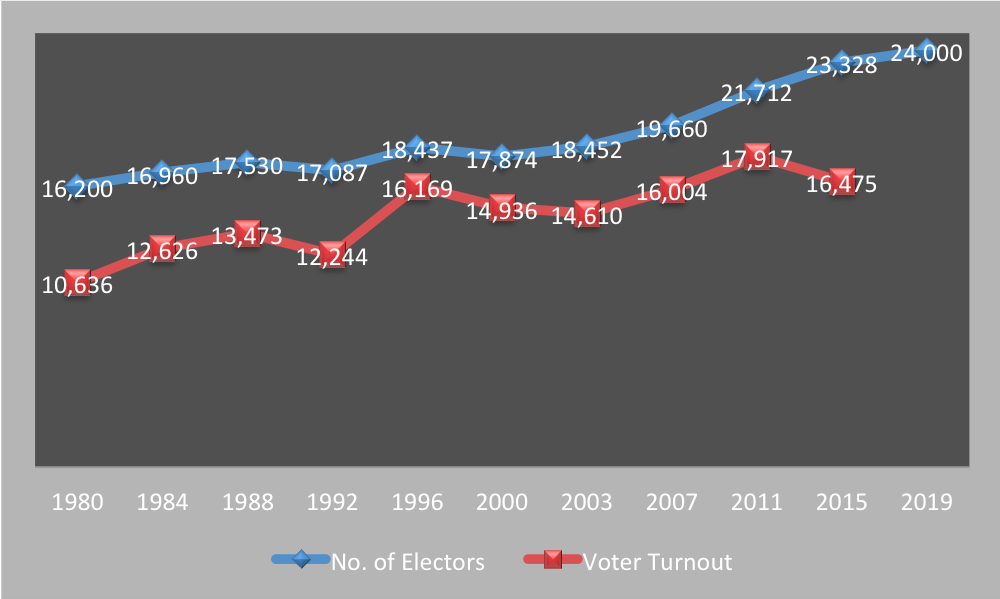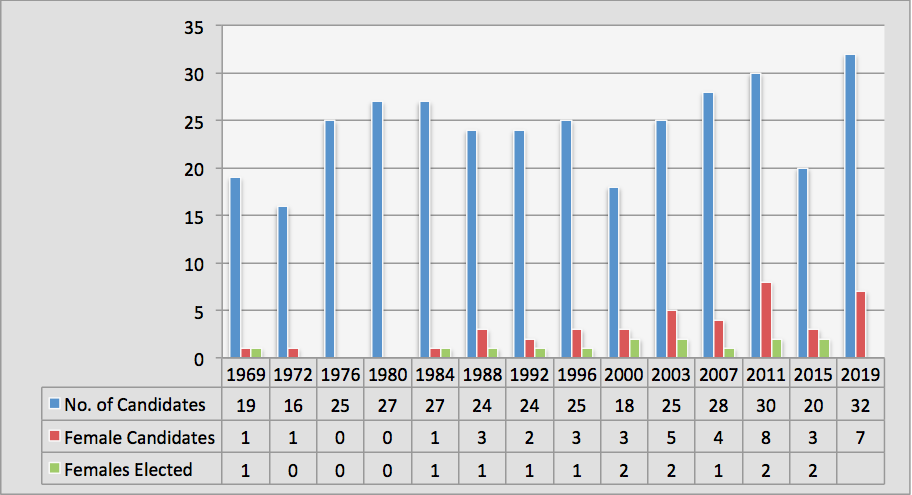2019 General Election Analysis: Bigger and Better?

By Adriana Lopez
For a general election largely being fought on an agenda concerning the environment, Gibraltar’s 24,000 strong electorate means more ballot papers than ever are eagerly waiting to be printed in the next two weeks.
Our electorate numbers may not be as impressive as the biggest democracy in the world – India, whose general election sprung up over a month and a half earlier this year with 900 million eligible voters - nevertheless, Gibraltar’s growing population has seen a steady increase in eligible voters since 2000.

Although Gibraltar usually ranks above-average in voter turnout when compared to other democracies in the world, the last election in 2015 saw the largest dip since 1980. This being said, the last election saw few changes to the makeup of parliament, except internal changes within the GSD line-up.
It is also interesting that 1996 and 2011 saw the highest voter turnout and respectively a big change in government. That’s not to say that more people voted just to overthrow previous government, but it definitely meant people were more politically motivated.
Most Candidates Ever
The 2019 General Election will see a record breaking 32 candidates compete for votes across three parties and two independents. Going back to the point on the environment, this means the longest ballot paper Gibraltar has seen coupled with several manifestos arriving at your door.
Of the 32 candidates, only seven are women. Why is this important? Because 22% female representation on the ballot paper falls short of the 50% in our society. Of the seven women standing, we know not all will be elected because of Gibraltar’s block voting system which means only two parties are likely to win seats.
For those already rolling their eyes, the point is not about having proportional representation. Surely when it comes down to it, we must choose the best person for the job. But why is Gibraltar’s track record of female representation in parliament so bleak?

Since 1969, several women have joined the race, with some elections seeing no female candidates, and others like the 2011 election reaching a record of eight women. Still, there have never been more than two females elected into parliament at the same time.
Although the traditional parties have usually run with a few women, historically they have been less likely make the cut. This might not be entirely the fault of the parties and perhaps some responsibility falls on the electorate.
Across Europe
Gibraltar really trails behind other countries. Our neighbour Spain together with Sweden and Finland have 47% female parliamentary representation, followed by Belgium 42%, France 39%, Italy and Portugal 35% and UK 32%.
There are two pertinent questions here in Gibraltar. 1) Why are women less likely to stand? 2) Why are the electorate less likely to vote for them?
You could try and answer the first by suggesting that parliament should be more accessible to women, and “Oh, women are less likely to stand because of family commitments”. Nevertheless, the answer to the latter also helps us understand why women are less likely to stand.
If the electorate are less likely to vote for women, then it becomes a vicious cycle as it raises the question again: why would women want to run in the first place? It is overwhelmingly a cultural issue too: if women are hardly represented in parliament, who are little girls and adolescents in Gibraltar, and beyond, meant to look up to and think ‘that could be me one day’?
The problem starts from a much younger age. A very Gibraltarian example: all your male cousins go to university and when it’s your turn, your great auntie turns to you and says “Pa’ que te va ir a Los Londres cuando aqui puede aplica pa’ un trabajo de gobierno”.
And it’s not just that. Up until a few years ago, certain subjects at GCSE and A-Level were targeted for ‘the girls’ and ‘the boys’. From experience, sociology was only an option for Bayside pupils, whilst girls were made to take the subject privately (not necessarily on basis of discrimination but more lack of teaching resources); until a few female colleagues won the right to attend Bayside.
The new coeducation system may help filter out some of the inequalities, and we can argue that women’s role in Gibraltarian society is just as important as men’s. Nonetheless, we could also argue that there have been years of systematic misrepresentation, and to prove it statistics of female representation in parliament show that not much has changed since 1969.
Again, the point is not to blindly have 50% representation at all costs, and it should be the best person for the job. But, can we really argue that there aren’t more strong and intelligent women capable of taking on parliament in Gibraltar?
Disclaimer: in no way is this article meant to discourage or undermine the capabilities of any of the 32 candidates (male or female) standing for election.
Adriana Lopez was previously at El Periódico de Catalunya. Currently living between Gibraltar and Barcelona, Adriana has spent the last six years studying politics with sociology in London, and then a masters in international journalism and one in political science.
Latest News
- Talk Explores Borders and Postcolonial Identity in Gibraltar’s Literature
- Minister Arias-Vasquez Addresses GFIA Annual Dinner
- New Rugby Pathway For Gibraltar’s Female Players
- Government Says It Is “Absolutely Committed” to Parity With UK
- Treaty Meetings in London
- Traffic Management Arrangements – Royal Engineers Association (REA) Freedom of the City Parade
- Gibraltar Rolls Out New Tool To Help The Building Sector Deliver On Net Zero Commitments
- Joe Stilgoe And The Big Band To Play St Michael’s Cave
- World Environment Day Shop Window Competition
- Craig Galliano And Justin Hewitt Drawn In Group D At World Cup Of Darts



